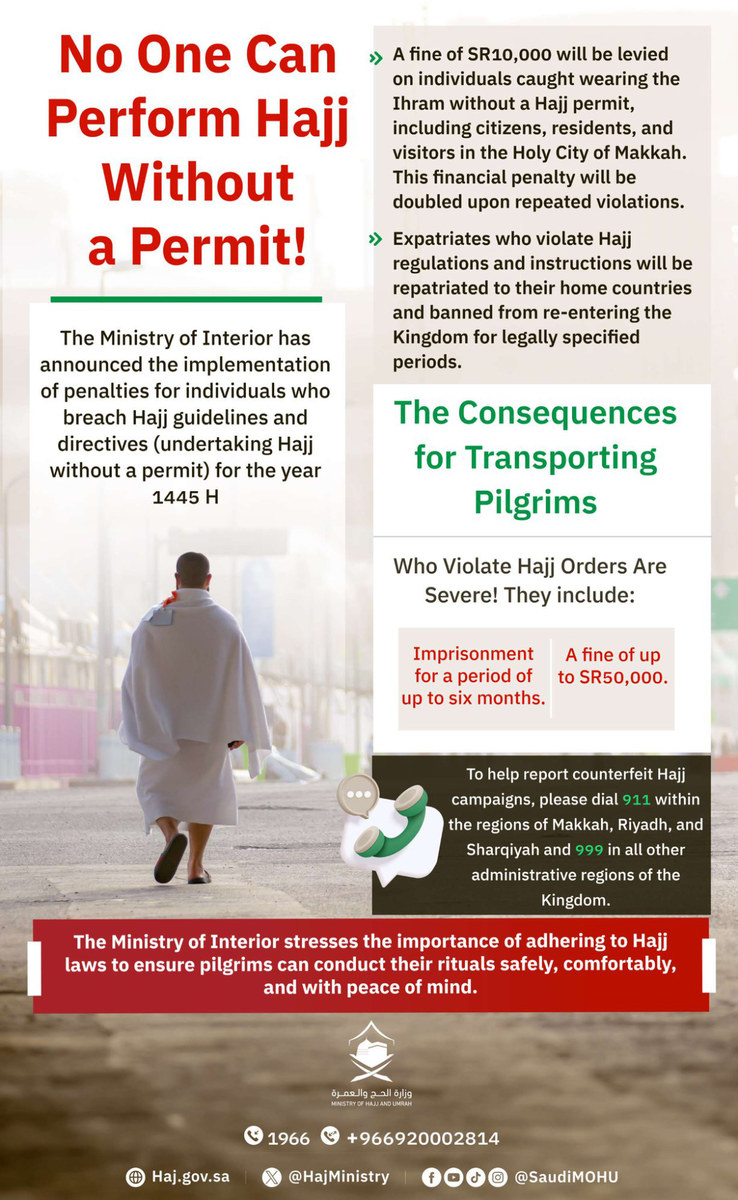Muslims embarking on the sacred pilgrimage of Hajj this year have been urged by the government to be mindful of the guidelines and regulations in place to protect the well-being of all.
Obtaining a Hajj permit is the most crucial step before embarking on the journey. This requirement applies to citizens, residents and visitors. Failure to have a valid permit can result in substantial fines and even deportation for expatriates.
At a press conference in Riyadh recently, Hajj and Umrah Minister Tawfiq Al-Rabiah launched the “Pilgrimage Without A Permit” campaign with the Ministry of Interior. The minister emphasized the importance of pilgrims adhering to the regulations and cooperating with the authorities.

In addition, an awareness campaign was launched in 20 countries warning of the penalties for violating Hajj regulations, including trying to perform the pilgrimage using tourist visas.
During the Hajj, pilgrims are expected to dress modestly and respectfully while at the holy sites. This is not only a matter of following the rules, but also a way to show reverence for the sanctity of the occasion. In the past, some pilgrims were fined for not adhering to the prescribed dress code.
Sheikh Abdulrahman Al-Sudais, head of the General Presidency for the Affairs of the Two Holy Mosques, has emphasized that pilgrims should adhere to the proper dress code.

The ihram is a central part of the Hajj and Umrah rituals, as it symbolizes the state of ritual consecration and equality among all pilgrims before Allah.
The ihram for men, reiterated Al-Sudais, is two unstitched, undecorated white garments known as izaar and rida’, which are for the upper and lower parts of the body. And men must not cover their heads.
Meanwhile, women must wear modest, loose-fitting clothing that covers the entire body except the face and hands. They are not required to wear the izaar and rida’, but their attire should be free of decorations.
During the Hajj, it is also important for pilgrims to avoid contravening crowd-safety regulations. They should follow the designated routes outlined by the authorities.
Furthermore, the government has warned that there would be severe penalties for those who bring drugs, alcohol or weapons into the holy sites.
To counter criminals claiming to be tour operators, and those trying to enter Makkah without proper visas, pilgrims are encouraged to report any suspicious activities by calling 911 in the Makkah region.
Mohammed Al-Bassami, director of Public Security in the region, said at a recent press conference: “Some violators want to employ tourism visas for the purpose of performing Hajj but every person who came to Makkah signed an electronic pledge that this visa does not enable him to perform Hajj.
He said the government has closed down more than 140 fake companies and added that “no one will escape punishment. The system is clear, and we urge all visitors to the Kingdom to respect its policies and regulations.”




Comments are closed.